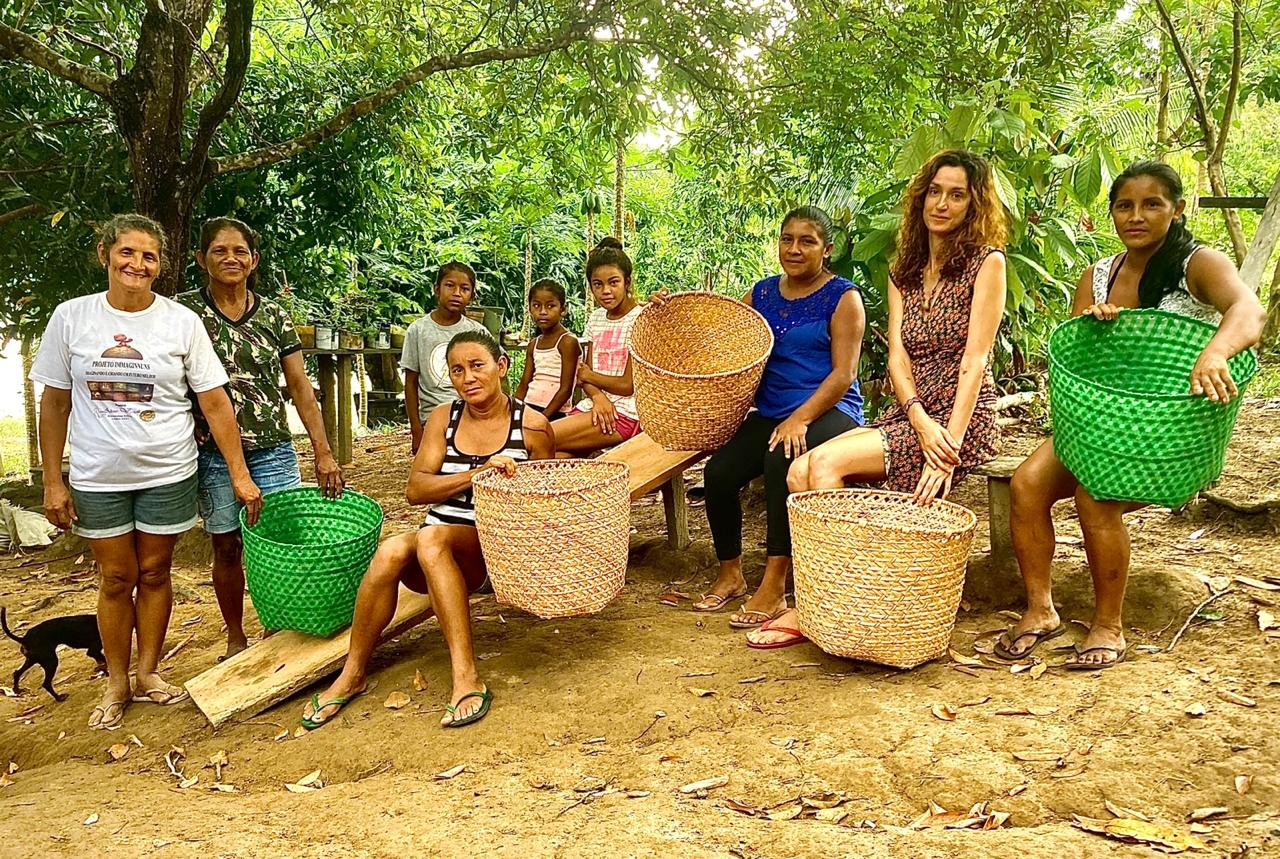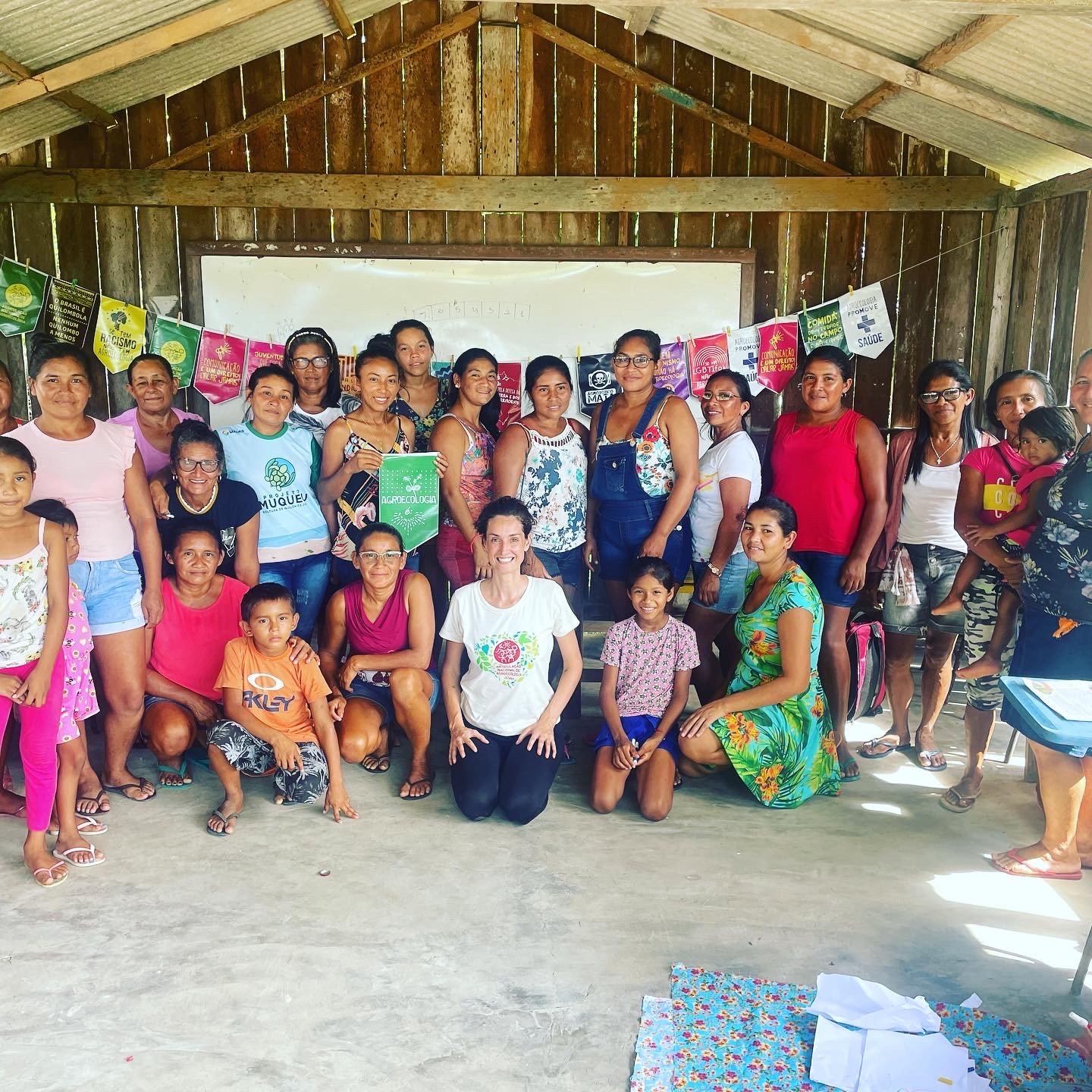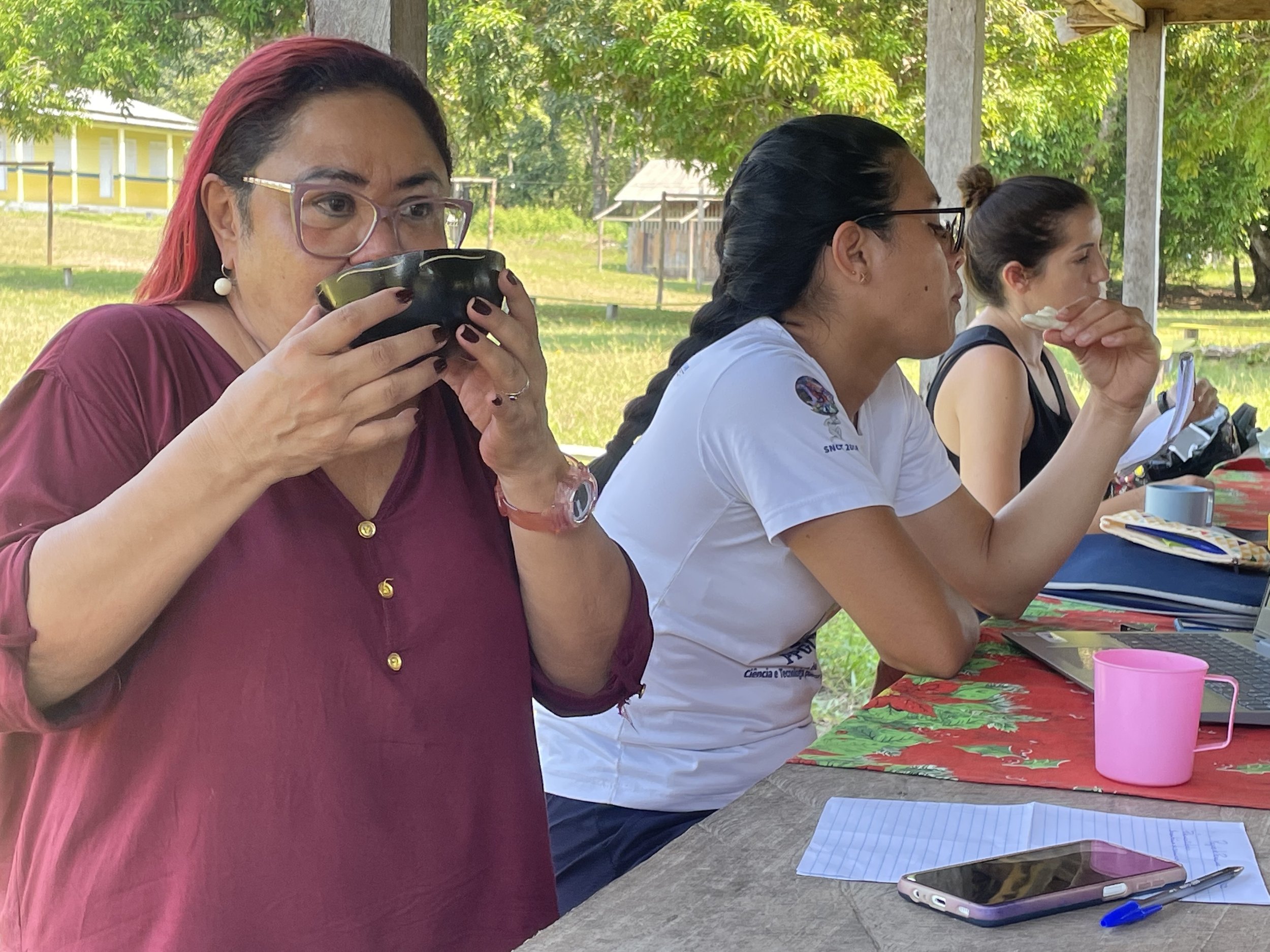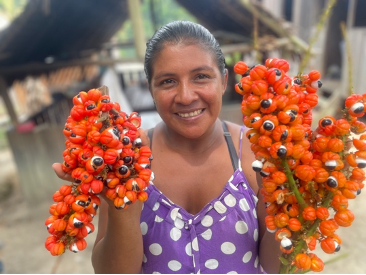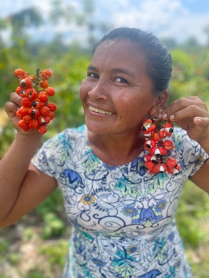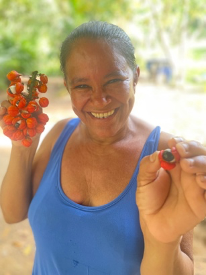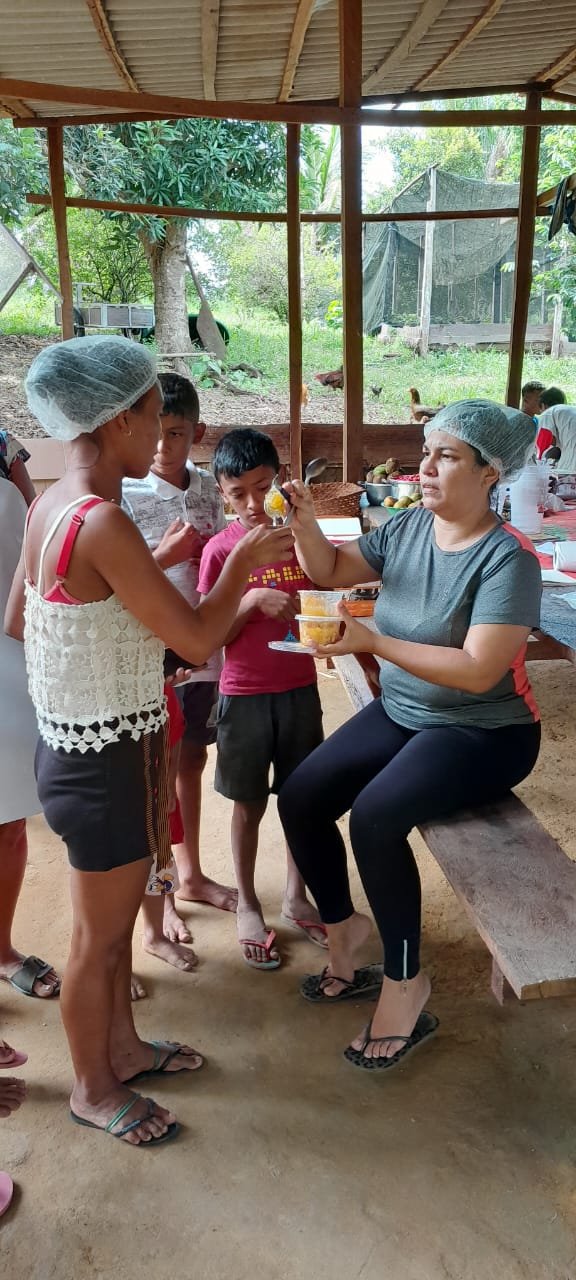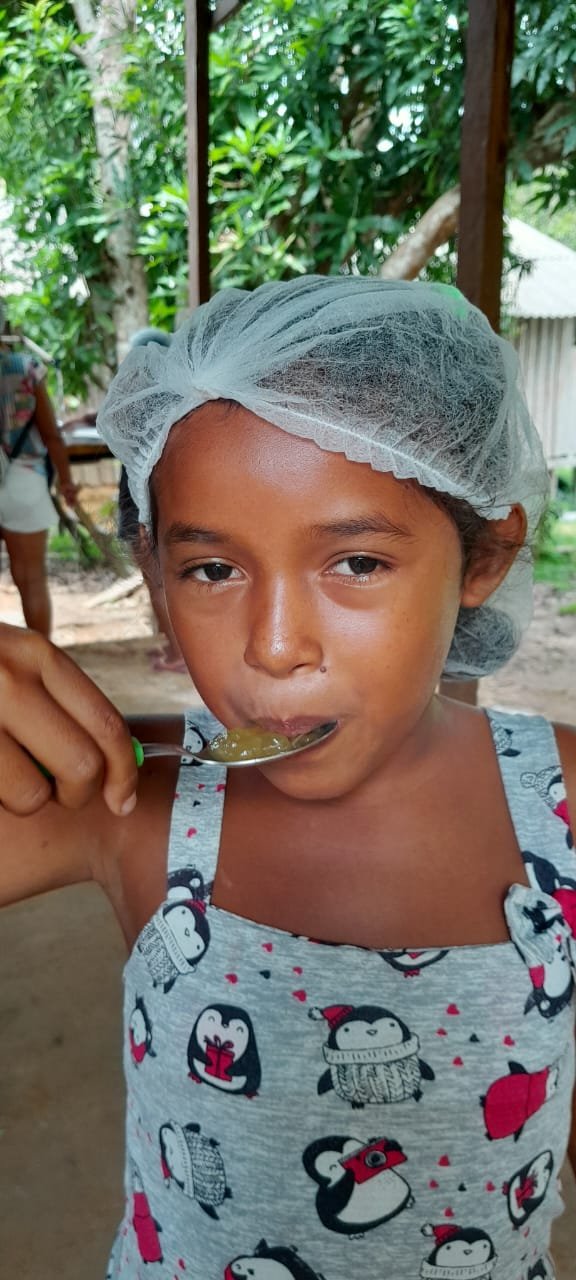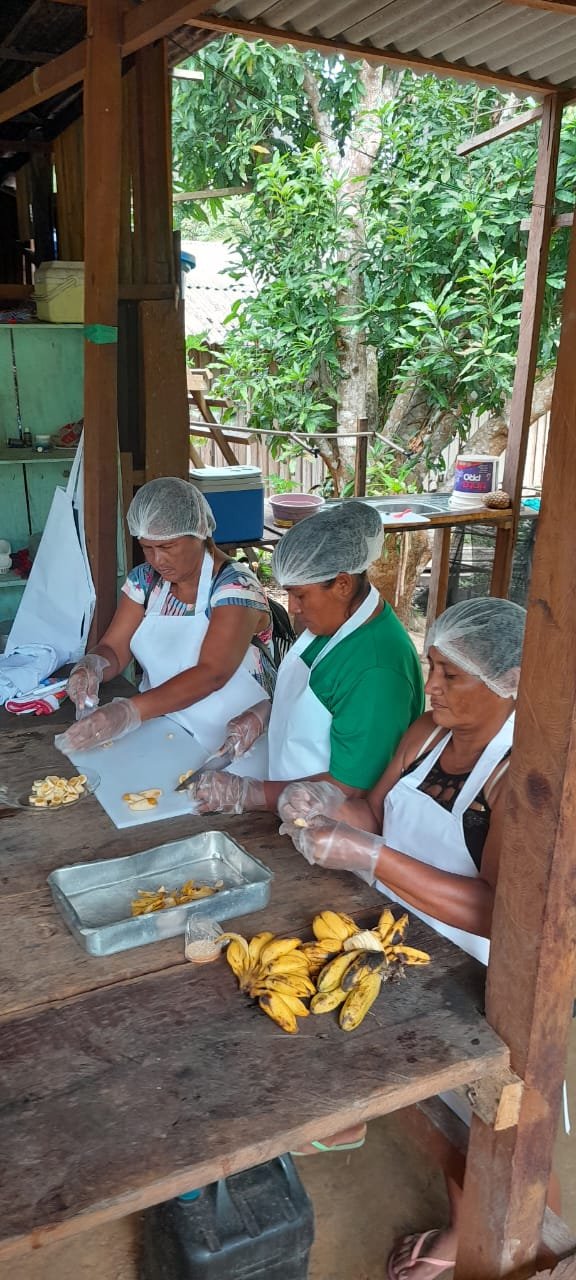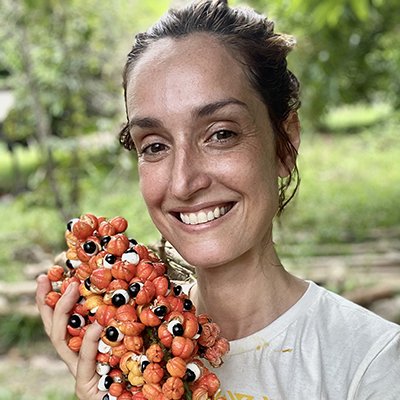The Agroforestry Systems and it's Joint Actions (part II)
This last installment of a two-part article, shared with us by our partner Instituto Piagaçu, offers a rare opportunity to listen to the insights from contributors to the project “Development of Agroforestry Systems Maués-Amazonas”.
—Regenerosity
Part II: How Do ASCAMPA Women Contribute To The Sustainable Development Of Their Communities?
LUANA: Women are essential for the sustainable development of the community, because they are the ones who take care of everyone, who manage the work and remain firm and strong in the fight for better days.
Riverside women are strong women, warriors who assume the role of contributing to a better country without poverty, they are women who take care home, garden and field. Women who go far beyond theory and perform everyday necessary practices for agriculture development and its multiple benefits.
Today, the women of ASCAMPA, through the Conversation Circles method, show that their role is not only help their companions in their work, especially domestic ones. We had observe that they do much more. They help in everything, from the most basic to the most complex activity. Woman are warriors who still cannot see the value of their daily work. This project seeks to bring the understanding that each activity carried out has value as significant as that of their partner does. This occurs through conversation circles and the agroecological booklet, deepening the teachings on the empowerment of rural women and the strengthening of this union.
Photos: Fabiana, Cleiciane and Francisca. Family farming, in November when the guarana harvest takes place.
THALITA: The Agroecological Booklet is a methodology constructed in such a way that it can adapt to each reality – which explains its potential, its dimension and its scope. That's what makes her quickly cease to be an "outsider". It is an instrument from which the reality and daily life of each woman is written, revealing hitherto invisible aspects in their work dynamics, hence the rapid identification with the instrument. In addition, we always reaffirm that the Notebook is a political-pedagogical instrument, which necessarily indicates that the women who take notes in the Notebooks quickly recognize themselves as protagonists of know-how. It is also essential that the technical team responsible for monitoring and systematizing the Handbooks undergo a process of raising awareness and training with regard to methodology, gender issues, inequalities, and also a qualified understanding of the concept of work , so that it can observe, recognize, reflect and intervene, in its performance, with ways to social transformation to guarantee fair social conditions between men and women.
HOW DOES THE RESEARCH: “COMMUNITY POTENTIAL TO ACQUIRE SOLAR ENERGY IN THE SCOPE OF THE SOCIAL PRACTICES OF WOMEN IN THE FORESTS”, RELATED TO OUR WORK TO DEVELOP AGROFORESTRY SYSTEMS?
IRAÍLDES: Solar energy is an agroforestry practice, it is within agroecological thinking. This research is focused on environmental conservation, insofar as it concerns the end of pollution with the burning of firewood. Women have a more effective rationalization towards environmental preservation and conservation than men. Contributing to them through community and gender training makes them more powerful in agroforestry practices.
The research is financed by Fapeam – Fundação de Amparo a Pesquisa do Estado do Amazonas. It is not an intervention project for the implantation of solar energy, this is, therefore, a posteriori step. The aim is to carry out an inventory of women's organizational potential within the scope of a self-managed association capable of supervising and monitoring a future solar energy project in the community. The idea is to contribute to the organization of women, in view of the social control of solar energy, given the fact that women are the most impacted by the lack of energy. My research perspective is interdisciplinary in the context of the complexity of agroecological thinking. There is, therefore, interrelationship with agroforestry practices and agroecology.
IFAM-Maués teachers: Socorro and Juliane from dr. Iraíldes, arriving in the community with the field team of the project Development of agroforestry systems Ramom, Luana and Jefferson.
IRAÍLDES: For approximately 30 years, I have been developing research on the theme of gender, and for around 15 years in the rural area of Amazonas, I have been carrying out a research project with women from the forest. The intention is to give visibility to these women who were silenced and excluded from history and science. Her research is focused on verifying in what sense the women of the forest can contribute to the lighting process through solar energy, exercising social control for when the solar energy system is implanted. The idea is to contribute to the social organization of women, so that they claim, together with the local government, the right to install solar panels in their communities and in the homes of residents. And more, when the signs are installed, that the women are well organized to carry out the social control themselves with the purpose of monitoring so that their undertakings do not suffer discontinuity.
Photos: Interweaving between gender research and the agroforestry project.
LUANA: Professor Dr. Iraíldes Caldas seeks to show the reality of a community that fights and strives for the municipality of Maués to continue being the Land of Guaraná, as the farmers of the Paricá and Urupadí rivers are the largest producers of guarana in the region. Unfortunately they don't have electricity, and this project will bring dignity to the community through solar energy.
IRAÍLDES: It's the women who go out to get firewood in the forest to cook on the wood stove and also make the fire that lights up communities without light. This greatly affects the health of these women. Not only because of the weight they carry but also because of the heat that reaches the womb and uterus. The research activity collects data using a form that contains open and closed questions and a direct interview, plus Conversation Circles methods, focus groups, lectures, workshops and mini courses.
Workshop on the use of social technology from the Agroecological Booklet.
IRAÍLDES: The choice of S. José do Rio Paricá community, is because this community has an organization, already has social actions in the community, such as the activities of REMA and IFAM/Maués, which contributes enormously to the development of the research. This fact weighed heavily on the development of research in Paricá, in addition to the organization of women in this community, which also has dona Amélia as the organizator matriarch.
Photos: Mara, Soniana and Alblenice strong women of the guarana tradition.
WHAT IS ECO-FEMINIST?
IRAÍLDES: Ecofeminism is a feminine ecological look, one that has a vision intertwined between human life, earth, forest, water. An eco-feminist conscience is general, it aims at a relationship with animals, with plants, with the beings of the forest, the animals, visages, tradition, myths, all elements of the cosmogonic universe. The social practices of forest women as midwives, healers, caregivers, artisans, potters, pajoas, are all within the ecofeminist perspective. There is the ecological look and its interweaving with nature and the elementals of the universe such as the moon, the wind, the rain and the sun. Oikos means house in Greek, and feminism, the gender gaze. The union of oikos (house) with feminism (looking at, and for women) results in ecofeminism. The planet is the house and women are the main subject of its conservation.
Teacher Jucyrene, photo in a Conversation Circle.
CAN ECO FEMINIST SOCIAL TECHNOLOGIES LIKE THIS ONE BE APPLIED IN ANY SUSTAINABLE DEVELOPMENT PROJECT?
IRAÍLDES: No. In order for these two concepts to be combined, the project must be based on a gender perspective. In most sustainable development projects, women do not appear, even though they are actively present in the actions. There needs to be a feminist look in the polls for women to appear. There are few gender researchers.
I fight for the gender theme to be expanded in the Amazon so that the number of these female researchers increases.
KAREN: Sebrae is a partner in this undertaking, it opened a tender and chose the company BIOTECH for training with women, seeking to build a new product. Biotech is a company focused on business solutions, where it connects the field to the market, creating solutions for small producers, from their work in the field to the product on the shelf. The product must be created by them, according to what they perceive (through the Conversation Circles and Agroecological Notebook) which raw material they find in their backyards, in the territory where they live, which can be transformed into this regional, agroecological product of value. After defining the product, Sebrae reserves a continuity program for them to be accessed.
THALITA: It is important to say that the agroecological booklet is a success among the women who take notes because it corresponds to an instrument that reflects the reality of women. It is through an active process, in which the farmer, the fisherwoman, the extractivist, the shellfish gatherer (among a universe of possibilities of women who take notes) take daily notes and reflectively look at their notes, that she realizes her role and importance in different fields. It is from there that they gain, conquer and recognize their autonomy; it is also from there that many of them recognize themselves in situations of violence, for example, and realize that they do not need to be in violent relationships; it is also through the Caderneta that women perceive a dynamic of production and commercialization revealed in notes that show a higher income than they imagined obtaining through this work; that women reorganize their way of producing and invest in certain products; that women turn to other women to clarify doubts about the notes and from there they form a group, a movement, an association and begin to occupy decision-making spaces. And it is also through these data that organizations that work with women from the countryside, cities, forests and waters organize a work agenda around women's demands; and that government sectors now receive subsidies for formulating public policies aimed at women.
Photos: Product tests and tasting with Karen Costa from BioTech, technology company chosen by Sebrae.
HOW WILL THE PRODUCT BE CREATED THAT IS MANAGED BY THEMSELF, AND THAT GENERATES INCOME FOR WOMEN?
RAMOM: We come to two suggestions for objective work with women, which enable two paths. The first way that appears is to make dehydrated fruit bars and/or other raw materials found in the community, such as cassava derivatives, or dehydrated tucumã. It would be a nutritional, functional food, with totally Amazonian characteristics, made with elements found in the communities. The other way pointed out, the second product option, would be guarana syrup whose extract is made from guarana, and mixed with natural sugar, made from pineapple or sugar cane, but mainly from pineapple, which is already widely produced in communities. So the second product option to be chosen for viability would be syrup with natural sugar. A healthy product with a truly Amazonian character. Guarana syrup is already widely available separately for sale on the market. It is also widely used to sweeten açaí. Natural sugar can be very interesting. Both options serve the fitness market, gyms, and markets in other countries and other states in Brazil where açaí is consumed with guarana syrup, and where bars of dehydrated products are consumed. The proposal is to choose and build this product with regional and healthy characteristics.
Mara, Cleiciane, Maria and Leonice, women from Paricá River with the raw material and prototypes of their products in hands.
RAMOM: These two product proposals have their prototypes. At this stage now, we are going to understand their acceptance by the group of women, as well as the understanding of how their participation will take place. There will be workshops to make these products, learn about hygiene techniques, dehydration techniques, techniques for extracting caffeine from guarana in an accessible way and in accordance with the reality of the community. In a way that results in economic leadership for these women and their families.
REFERENCE LINKS
Brasil de Fato (Agroecological Booklet)
Part II: How do ASCAMPA Women Contribute to the Sustainable Development of their Communities? will be published next week Thursday 23rd March, 2023.
Text organized by:
LIVIA PRESTES Activist in Maués in the state of Amazonas since 2019. Social communicator, fundraiser for culture and sustainable development projects that operate in the Amazon Agroecology Network Maniva. She is also a scenic artist, producer and cultural agent. “The training we had at the ANA (National Articulation of Agroecology) was fundamental for us to understand how to apply the available social technologies. However, for each territory, they happen in their own particular way for each group. The Amazonian communities have a tradition of collective organization, so the group develops very quickly, they take advantage of it a lot! It is a joy to see how things are happening, people and opportunities arising, institutions getting closer, creating a network. It's very rewarding to be on projects like this, you work a lot, and you learn a lot more.The future is feminine and Amazonian”.

